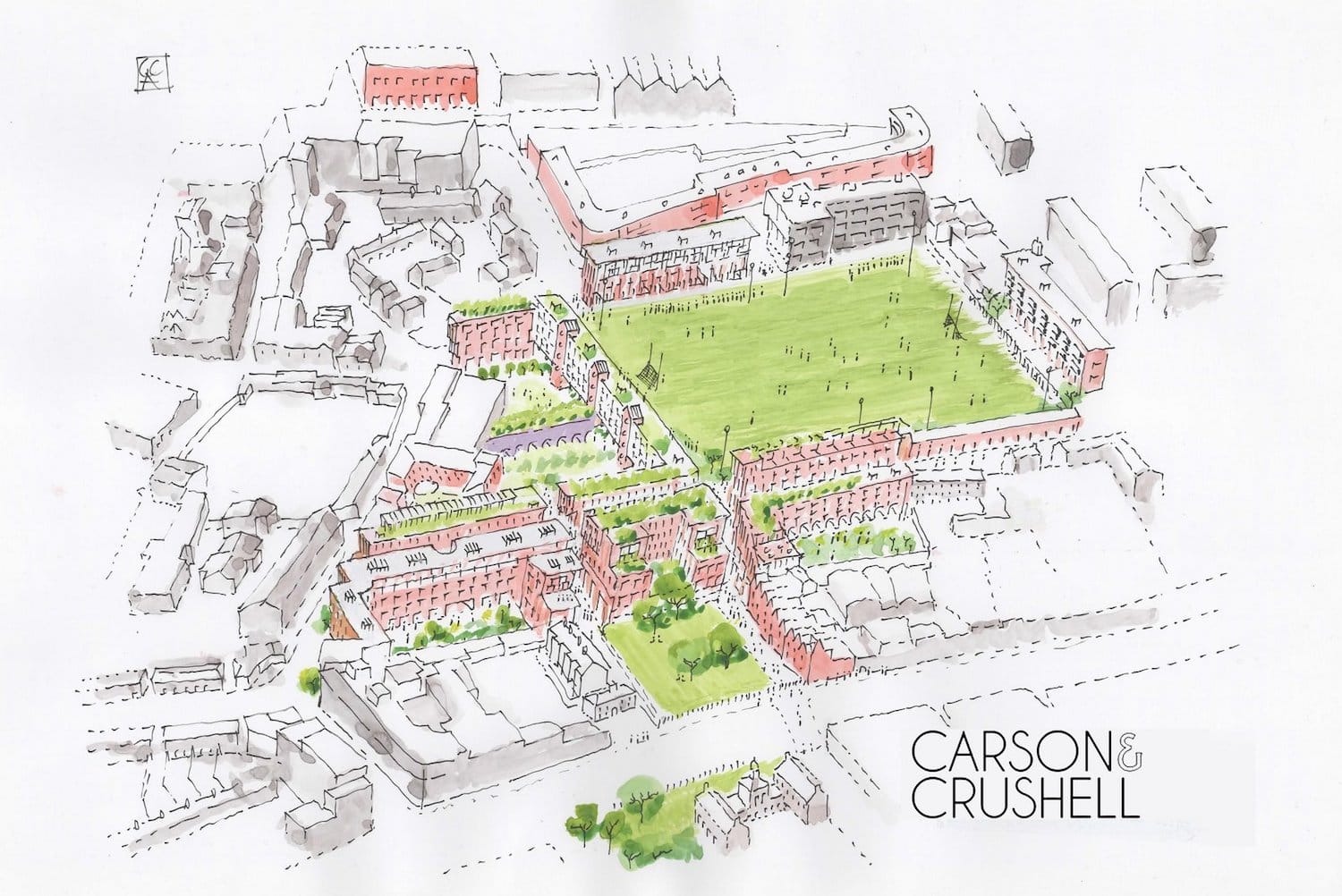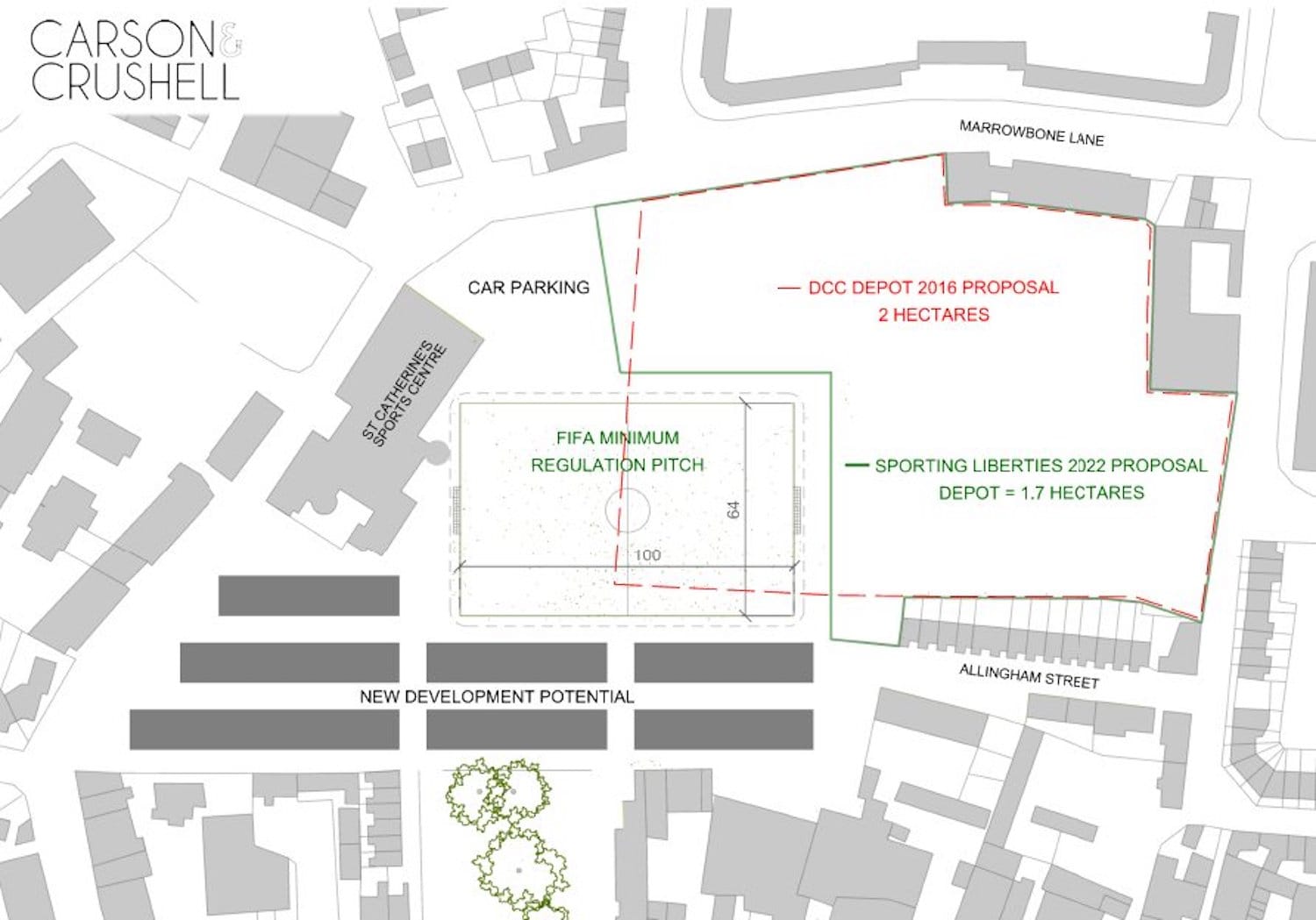What’s the best way to tell area residents about plans for a new asylum shelter nearby?
The government should tell communities directly about plans for new asylum shelters, some activists and politicians say.
To get council managers to the bargaining table, elected representatives rezoned the site to block their plans. Chief Executive Owen Keegan was not pleased.

It’s almost four years since councillors voted to rezone 11 acres of council land at Marrowbone Lane, part of which is used as a council depot.
In doing so, they were going along with a plan from city managers to revamp the site, with a new, smaller depot and a mixed-use development including 100 homes and two practice sport pitches.
The depot – which council staff use as a base for providing city services – is in the Liberties, between St Catherine’s Sport Centre and the council’s bring centre. It’s down the road from the Guinness Storehouse.
There’d been a long debate over how best to use the site.
Since then, local elections in May 2019 brought in many new faces among Dublin City Council’s 63 councillors. They have a different idea for regenerating the depot lands – including putting a bigger sports pitch there, something some local residents have for many years been campaigning for.
In November, that put these councillors in conflict with council managers still pushing their own plan for the site.
At a meeting to finalise the new city development plan, setting out the council’s vision for how the city will develop from 2022 to 2028, it came to a head.
Michael Pidgeon, a Green Party councillor, said efforts by councillors and locals to engage with council managers to find a way to integrate the pitch into their plans, had failed.
“A reasonably sized pitch, to allow people to train. There are no pitches there,” he said at the meeting, as there aren’t any sports pitches in the Liberties. “We’ve kind of gotten nowhere. I really want to find a compromise.”
To bring council management to the negotiating table, he brought a motion asking for the site to be zoned as an open space. The idea being, if it passed, council managers wouldn’t be able to build what they wanted with the land, and would have to come to a compromise on the sports pitch to move forward.
At the meeting, Owen Keegan, the council’s chief executive, spoke against the rezoning, saying it would block the redevelopment of the depot.
“To put a blanket open space zoning on this means we can’t have any depot,” Keegan said. “We can’t even upgrade the depot facilities. The depot facilities are totally inadequate.”
“Playing into the hands of a particular group who wants a full sized pitch, without any regard to the needs of council workforce, given how flexible management has been, I don’t think it reflects very very well on the council,” he said.
“If you zone this open space, we can’t really do anything,” he said, so it would be better to work around the parameters of the status quo.
In the end, 48 councillors voted down Keegan’s effort to keep the zoning as it was (with two backing him and two abstaining), and then councillors voted to back Pidgeon’s rezoning.
Tom Magee, a member of Sporting Liberties, a group that is advocating for a place for a proper sports club in the area, says locals have been pushing for the Marrowbone Lane depot as the spot for years now.
Nothing’s been happening on the site, he says. “It’s been really frustrating.”
Sporting Liberties contracted Carson and Crushell Architects to draw up designs for the site, he says, so that the group had something to send to the council, said J.J. O’Mahony, also a volunteer for Sporting Liberties.
The site sketches show space for a two-hectare council depot, next to 1.7 hectares for a full-sized soccer and Gaelic football pitch. Sports are really needed in Dublin 8, says O’Mahony.
“When you’re in a team of 15 or 20 people, you learn skills, coping skills, social skills,” he says. “You’re competing against other people, but in a positive way.”


“There’s no forum for that in Dublin 8,” he said. “Kids on Francis Street playing P.E. on the tarmac with concrete pillars.”
O’Mahony says that, “All these people, on the same page, at the same page, lined up to the level where you’ve got drawings done, you’ve got all the community involved” he says. “We’ve identified a major solution to a major problem.”
There was an agreement for a sporting ground at St Teresa’s Gardens, says O’Mahony.
In 2020, councillors agreed toa land swap with the developer Hines, which owns the Player Wills and Bailey Gibson sites near St Teresa’s Gardens, in exchange for which the developer would build a full-sized GAA pitch.
But that depends on Hines getting final planning permission for its scheme, and in mid-2021 the High Court referred the decision by An Bord Pleanála to grant planning permission to the European Court of Justice, following a legal challenge by local residents.
Anyway, there’s enough demand in this part of Dublin 8 for two sports facilities, O’Mahoney says.
“Sport for young people hasn’t been seen as a priority for Dublin City Council,” says O’Mahony.
“What we feel now is that we are going to have no option but to take legal action and engage under the Aarhus convention”, he said, referring to a United Nations convention requiring the public to have access to justice on environmental matters.
The council’s aim is for the Marrowbone site to be one of two “super depots” in the city – this one serving the south side, while a new depot in Ballymun serves the north side.
Keegan, at the November meeting, said that the plan had been for the council to have 55 percent of the land for social housing and recreation space, and 45 percent for a more compact, super depot.
Keegan said the council had been responding to the need for more open, green space in the Liberties. “We have developed two substantial parks in the last 4 years.”
The council has built Weaver Park, and Bridgefoot Street Park, and also refurbished St Audeon’s Park. “It’s not that we have been insensitive,” he said.
He spoke strongly in favour of moving ahead with council managers’ plan for the Marrowbone Lane depot site. If councillors rezoned it, that wouldn’t be possible, he said.
But that appeared to be the aim.
Blocking managers’ plans for the site would give councillors more bargaining power to decide what happens there, said Catherine Stocker, a Social Democrats councillor.
Máire Devine, a Sinn Féin councillor, said that council managers had dangled the possibility of dividing the site into recreation and depot space like a carrot, she said.
“You seem sincere in allowing discussions, but the discussions that we’ve had to date have led us up the garden path a little bit,” she said, to the chief executive.
Pigeon said discussions with the council management have gotten nowhere, which is why there was a need to rebalance the scales.
“I’ve tried to engage over and over again with management on this. We got nowhere, we got no proposal back on how the site could work,” he said.
To the Sporting Liberties’ architect’s plans, says Pidgeon, “we basically got a two sentence response saying no, that wouldn’t work with the streetscape”.
“It feels like there’s been no movement, and simply a reiteration of, there was a deal done by a completely different set of councillors a few years ago, that we don’t know about,” he said.
Darragh Moriarity, a Labour Party councillor, said that councillors wanted to negotiate from the position that the space is prioritised for green space. “We’re not asking to rid this site of a consolidated depot, we absolutely understand the need for that.”
Joe Costello, a Labour Party councillor, said that there should be enough space on the site for a compromise. “That doesn’t rule out one or the other.”
At the meeting in November, Keegan said that only 45 percent of the site is needed for the new depot. “I’ve nowhere else to move that depot, but I can consolidate the depot,” he said.
The plan sees the rest of the land being put to other uses. “It was certainly our view always that that should include social housing. But if the members don’t want, and just want to give that over to pitches, but we only wanted to keep 45 percent of the depot.”
Dublin City Council didn’t respond to queries sent Friday asking why there has been so little progress on the site, whether it has drawn up final plans, or sought funding to develop it.
Magee, of Sport Liberties, says it struck him that, when he met young children in his wife’s family, who are from the Liberties, none of them were into any sport.
“None of them had ever played football or owned a pair of football boots or anything,” he said. “I just realised there’s no sport, no sports clubs, no team sports, none of that.”
It takes a lot of effort to continue campaigning, Magee says. “It shouldn’t be this hard.”
“We’re willing to compromise, if they are willing to compromise,” he said.
Get our latest headlines in one of them, and recommendations for things to do in Dublin in the other.